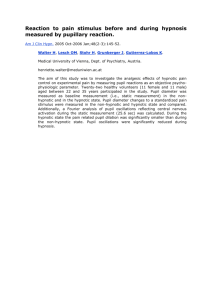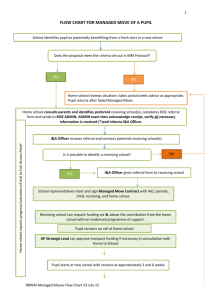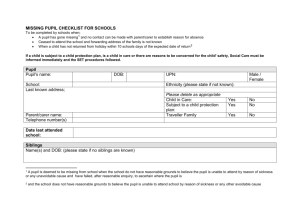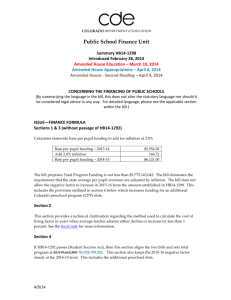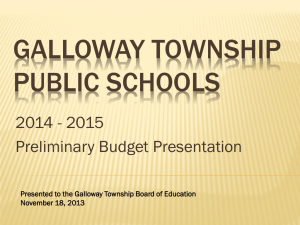Document
advertisement
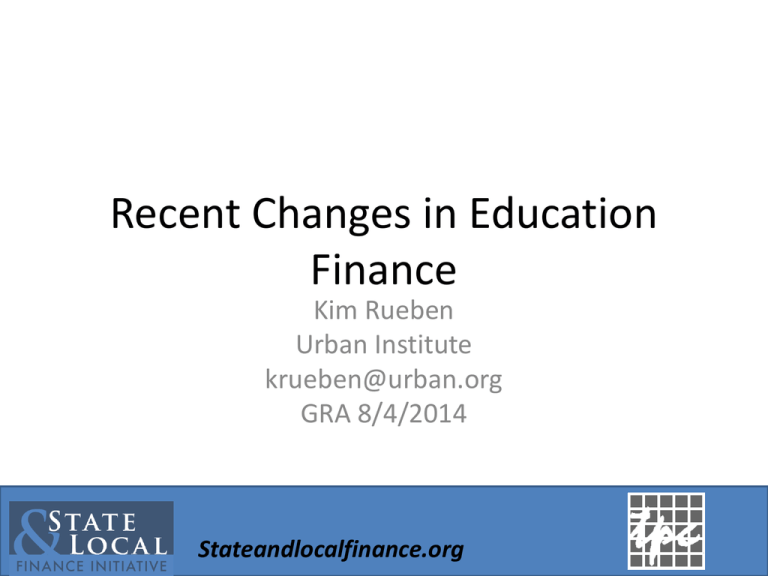
Recent Changes in Education Finance Kim Rueben Urban Institute krueben@urban.org GRA 8/4/2014 Stateandlocalfinance.org Outline • • • • Overall trends in K-12 finance Changes since 2000 Who should decide funding options? Case study: California Stateandlocalfinance.org 2 Background • Spending per pupil has been growing over time • In part because states have taken a larger role in education finance to improve equity in resources and to improve educational outcomes across districts • Increased state role usually financed through increased state taxes such as income and sales taxes • Lowering reliance on the property tax for schools • Long-run trend has changed somewhat recently during the last two recessions – Shift back to property taxes in 2002-2003 – Larger federal role with ARRA Stateandlocalfinance.org 3 14,000 12,000 $ / Pupil (2011) 10,000 Local Per Pupil ($) (2011 Dollars) 8,000 State Per Pupil ($) (2011 dollars) Federal Per Pupil ($) (2011 Dollars) 6,000 4,000 2,000 0 School Year Stateandlocalfinance.org 4 Per Pupil Spending (2011) 5 Changing spending per pupil increased since 2000 6 But more variation since the Great Recession Stateandlocalfinance.org 7 Stateandlocalfinance.org 8 Stateandlocalfinance.org 9 Stateandlocalfinance.org 10 Stateandlocalfinance.org 11 Is California Harbinger for Country? • Why California? – – – – Large state with diverse population Lots of children A lot of recent activity I know it • California Education Finance – Limited local revenue – A lot of state funding and rules – Complicated because of 40 years of lawsuits and ballot initiatives • Information from Weston/PPIC Stateandlocalfinance.org 12 School Finance System is Complex 2005-2006 Revenues Total K-12 Revenues $62.3B Prop 98 Non Prop 98 72% 28% Revenue Limits Categoricals Other State Lottery Other Local Federal 52% 20% 7% 1% 9% 12% Property Taxes General Fund General Fund Special Funds 19% 33% 6% 0.2% Source: PPIC Stateandlocalfinance.org 13 California’s Old Funding “Formula” • Base: revenue limits – Each district has unique per-pupil funding amount based on 1972-73 expenditures – At least 20 adjustments, largely based on history – Separate formulas for charter schools and rural schools • Supplemental funding: categorical programs – At least 100 other programs – No clear or consistent allocation formula Stateandlocalfinance.org 14 Recent activity to help address shortcomings • Questions of – Adequacy – Equity – Transparency • New proposals: – New funding formula – Lawsuit questioning tenure and teacher allocation Stateandlocalfinance.org 15 Changes adopted during and after recession • During recession categorical groups combined – school districts given more flexibility (2009) • Increased funding levels with passage of Proposition (30) temporary tax system – Expected to increase $1800 between 2016-2017 and 2013-14 • Local Control Funding Formula (July 2013) – Weighted student formula – Increase revenues per pupil for disadvantaged students (low-income, ELL, foster youth) – Additional funds for districts in which more than 55% of students are disadvantaged • Vergara v. California – questioning state’s teacher tenure, dismissal and layoff rules. Court found for plaintiffs but in appeal Stateandlocalfinance.org 16


